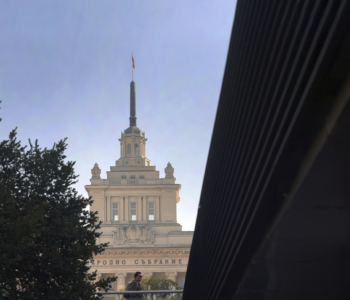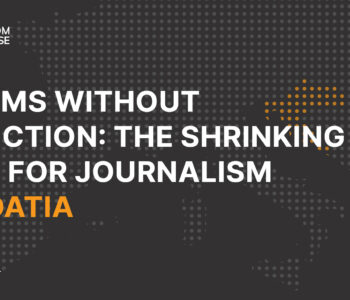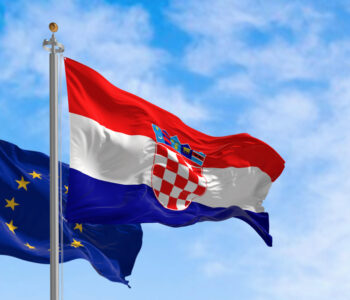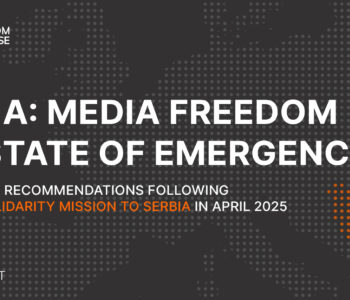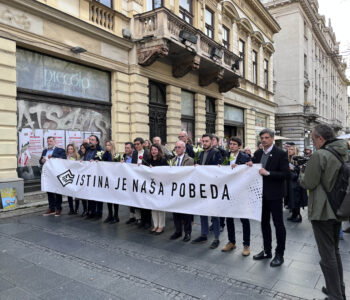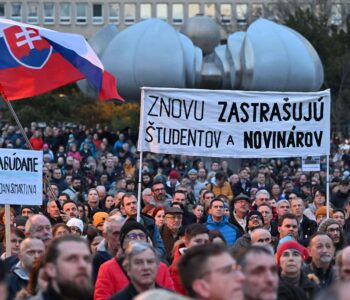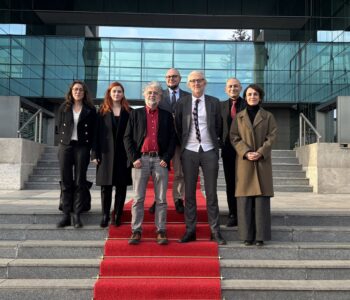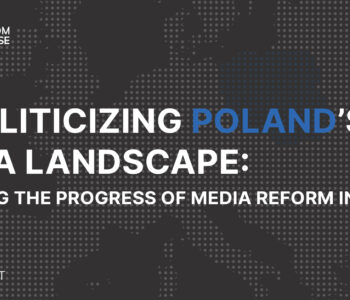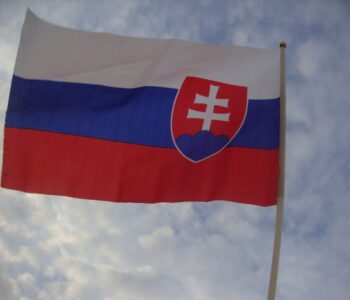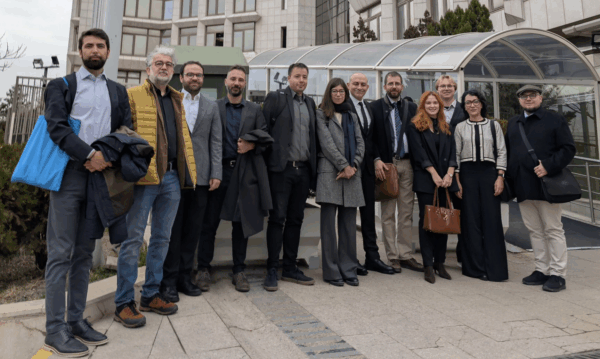 Allgemein
Allgemein
Turkey: 7th International press freedom mission concludes
Turkey: 7th International press freedom mission concludes
Ankara, November 26, 2025 – A mission delegation composed of eight international press freedom, free expression and human rights organisations has concluded a joint press freedom mission to Türkiye. The delegation met with journalists, civil society, political party representatives, MPs, the judicial branch, regulatory bodies, and foreign diplomatic missions to discuss Türkiye’s rapidly deteriorating media freedom environment.
26.11.2025
This seventh international press freedom mission to Türkiye, held in Ankara from 24 to 26 November 2025, was led by the International Press Institute (IPI) and included Amnesty International, ARTICLE 19 Europe, the Committee to Protect Journalists (CPJ), the European Centre for Press and Media Freedom (ECPMF) and Osservatorio Balcani Caucaso Transeuropa (OBCT) as part of Media Freedom Rapid Response (MFRR), Reporters Without Borders (RSF) and the South East Europe Media Organisation (SEEMO).
During the visit, the delegation held meetings with the Turkish Constitutional Court, the Radio and Television Supreme Council (RTÜK), the Delegation of the European Union to Türkiye, several foreign diplomatic missions, and representatives of Türkiye’s political landscape, including MPs from the Republican People’s Party (CHP) and the Peoples’ Equality and Democracy Party (DEM). The mission also met with the Association of Journalists in Ankara as well as members of the broader journalism community.
Despite multiple requests, government institutions, including the Directorate of Communications, the Ministry of Justice, Ministry of Interior, and several other ministries, as well as representatives of the AKP and MHP, declined to meet with the delegation or did not respond.
The mission delegation raised for consideration a wide variety of issues that have led to a further decline in press freedom in Türkiye, since our last mission in November 2024. The situation this year has been marked by a sharp escalation in political pressure, judicial harassment and censorship targeting the press.
Since 19 March 2025, high-profile detentions, including the imprisonment of opposition mayors and municipal officials that were largely viewed as politically motivated, were accompanied by large-scale protests that authorities met with mass detentions and restrictions on coverage. Journalists documenting the events faced early-morning police raids, physical assaults, and attempts from authorities to silence them, such as the warning from the former RTÜK chair that failure to “remain free from political bias” while covering protests would result in maximum penalties, including the revocation of licenses.
The mission delegation also highlighted a troubling pattern of punitive actions against critical outlets and journalists. Journalists across the country continue to face assault, threats, and intimidation, while criminal investigations and prosecutions against them remain commonplace. Prolonged arbitrary pre-trial detention and politically motivated investigations and prosecutions, such as those against journalists Furkan Karabay and Fatih Altaylı, reinforce the climate of fear and self-censorship.
Regulatory bodies continue to leverage their authority to silence dissent. As an institution with eroded independence that urgently needs reforms to restore its autonomy, RTÜK imposed heavy fines and broadcast bans targeting critical television outlets, a practice that deprives the public of critical voices. The Press Advertising Agency’s restrictive and one-sided criteria for distributing public advertising further strained the survival of local independent media. Although the Constitutional Court annulled parts of the agency’s mandate, economic pressure continues to serve as a tool of control. We also note with alarm the bandwidth throttling of social media platforms and messaging services during events of significant public interest, and the resurgence of “foreign influence” narratives used to justify interference in independent journalism.
The delegation urges Turkish authorities to end the judicial harassment of journalists, fully implement the decisions of the Constitutional Court on freedom of expression at all levels, and guarantee due process and fair trial rights. We call on regulators to cease arbitrary sanctions and repeat that they must operate independently and transparently. Türkiye must safeguard open debate, restore unrestricted digital access, and stop vilifying civil society or the press through vague accusations under its overly broad and vague criminal provisions including those in its anti-terrorism law, in violation of the country’s constitutional and international human rights obligations to protect the rights to freedom of expression, association and assembly. Türkiye should also respect international standards and practices in issuing press cards as a free decision of journalist associations and media.
Ensuring a safe, free and pluralistic media environment is essential to democracy, the rule of law, and the meaningful protection of human rights. The steps taken in 2025 have moved Türkiye further away from these standards. At the same time, the mission delegation underscores that ongoing peace negotiations could serve as a crucial opportunity to advance comprehensive reforms that strengthen journalists’ rights, safeguard pluralism and help rebuild respect for fundamental freedoms. We call on the authorities to reverse the current trajectory and to engage meaningfully with domestic and international stakeholders to uphold press freedom and freedom of expression.
This statement was coordinated by the Media Freedom Rapid Response (MFRR), a Europe-wide mechanism which tracks, monitors and responds to violations of press and media freedom in EU Member States and Candidate Countries.

Türkiye: Uluslararası basın özgürlüğü misyonu ziyaretleri tamamlandı
Basın özgürlüğü, ifade özgürlüğü ve insan hakları odaklı çalışmalar yürüten sekiz uluslararası kuruluştan oluşan heyetimiz Türkiye’deki basın özgürlüğü misyonunu tamamladı. Heyet, Türkiye’nin giderek kötüleşen medya özgürlüğü koşullarına ilişkin endişelerini gazetecilere, sivil toplum temsilcilerine, siyasi parti yetkililerine, milletvekillerine, yargı organlarına, düzenleyici kuruluşlara ve diplomatik temsilciliklere iletti.
Uluslararası Basın Enstitüsü (IPI) öncülüğünde 24-26 Kasım 2025’te Ankara’da düzenlenen yedinci uluslararası basın özgürlüğü misyonuna Uluslararası Af Örgütü, ARTICLE 19, Gazetecileri Koruma Komitesi (CPJ), Avrupa Basın ve Medya Özgürlüğü Merkezi (ECPMF), Osservatorio Balcani Caucaso Transeuropa (OBCT), Sınır Tanımayan Gazeteciler (RSF) ve Güney Doğu Avrupa Medya Örgütü (SEEMO) katıldı.
Heyetin ziyaret ettiği kurumlar arasında Anayasa Mahkemesi, Radyo ve Televizyon Üst Kurulu (RTÜK), Cumhuriyet Halk Partisi (CHP), Halkların Eşitlik ve Demokrasi Partisi (DEM) ve bağımsız milletvekilleriyle Avrupa Birliği Türkiye Delegasyonu ve yabancı diplomatik temsilcilikler yer aldı. Ayrıca, Ankara Gazeteciler Cemiyeti ev sahipliğinde yapılan görüşmelerdeyse Türkiye’den basın özgürlüğü kuruluşlarıyla gazeteciler yer aldı.
İletişim Başkanlığı, Adalet Bakanlığı, İçişleri Bakanlığı ve diğer bakanlıklar da dahil çeşitli devlet kurumlarının yanı sıra Adalet ve Kalkınma Partisi (AKP) ve Milliyetçi Hareket Partisi (MHP) temsilcilerine gönderilen resmi görüşme taleplerine ya yanıt alınamadı ya da görüşme talepleri reddedildi.
Yapılan görüşmelerde, Kasım 2024’teki son misyondan bu yana Türkiye’de basın özgürlüğünü daha da zayıflatan çeşitli meseleler gündeme alındı. Heyet, 2025’te basına yönelik siyasi baskıların, yargı eliyle uygulanan yıldırma politikalarının ve sansürün artışına dikkat çekti.
19 Mart 2025’ten bu yana yaşanan gelişmelerde, muhalefet belediye başkanlarının ve yetkililerinin tutuklandığı, siyasi saikli olmakla eleştirilen sansasyonel davalar geniş çaplı protestolara yol açtı. Yetkililer, bu protestolara kitlesel gözaltılar ve haber kısıtlamalarıyla karşılık verdi. Toplumsal olayları belgeleyen gazeteciler sabah saatlerinde yapılan ev baskınlarıyla gözaltına alındı, fiziksel saldırıya uğradı. Eski RTÜK Başkanı’nın, protestoları haberleştirirken siyasi tarafsızlıktan sapmaları halinde en ağır yaptırımların, hatta lisans iptallerinin uygulanacağı yönündeki uyarısı da dikkati çekiciydi.
Heyet, eleştirel medya kuruluşlarına ve gazetecilere yönelik kaygı verici cezaları da gündeme getirdi. Gazeteciler gözdağı, tehdit ve fiziksel saldırılara maruz kalmaya devam ederken açılan davalar da yaygınlığını koruyor. Gazeteci Furkan Karabay ve Fatih Altaylı örneklerindeki gibi, uzun süren tutuklu yargılama ve siyasi saikle ilerleyen cezai süreçler korku ve otosansür ortamını pekiştiriyor.
Düzenleyici kurumlar da yetkilerini kötüye kullanarak muhalif sesleri susturmaya devam ediyor. Bağımsızlığı ciddi ölçüde aşınmış, özerkliğini yeniden tesis etmek için kapsamlı reformlara ihtiyaç duyan RTÜK’ün, eleştirel televizyon kanallarına uyguladığı ağır para cezaları, yayın yasakları ve ekran karartmaları kamuoyunu bağımsız seslere erişmekten mahrum bırakıyor. Basın İlan Kurumu’nun (BİK) kamu ilanlarının dağıtımındaki kısıtlayıcı kriterleri, yerel ve bağımsız medya kuruluşlarının ayakta kalma mücadelesini zorlaştırıyor. Anayasa Mahkemesi, BİK’in bazı yetkilerini iptal etmiş olsa da ekonomik baskı bir kontrol aracı olarak varlığını sürdürüyor.
Heyet ayrıca toplumsal öneme sahip olaylar esnasında sosyal medya platformları ve mesajlaşma uygulamalarına erişimin kısıtlanmasının ve bağımsız gazeteciliğe yönelik müdahaleleri meşrulaştırmak için yeniden dolaşıma sokulan “etki ajanlığı” söylemlerinin endişe verici biçimde arttığını vurguladı.
Yetkililer, yargı eliyle gazetecileri yıldırma politikalarının önüne geçip, Anayasa Mahkemesi’nin ifade özgürlüğüne ilişkin olumlu kararlarını uygulamalı ve adil yargılanma hakkını güvence altına almalı. Düzenleyici kuruluşları keyfi yaptırımları sonlandırmaya ve basın denetim organlarının bağımsız ve şeffaf bir şekilde faaliyet göstermesini sağlamaya davet ediyoruz. Türkiye özgür tartışma ortamını korumalı, dijital erişim sınırlamalarına son vermeli ve hem sivil toplumu hem de basını terörle mücadele de dahil muğlak ceza hükümleriyle hedef almaktan vazgeçmeli. Ayrıca uluslararası standartlara uyarak basın kartlarının gazeteci dernekleri ve medya kuruluşlarının özgür kararıyla verilmesinin önünü açılmalı.
Özgür, çoğulcu ve güvenli bir medya ortamı demokrasi, hukukun üstünlüğü ve insan hakları için hayati öneme sahip. 2025’teki gelişmeler Türkiye’yi bu standartlardan daha da uzaklaştırdı. Fakat halihazırda devam eden barış müzakereleri, gazetecilerin haklarını güçlendirmenin, çoğulculuğu güvence altına almanın ve temel özgürlüklere riayeti yeniden tesis etmenin önünü açacak kapsamlı reformlar konusunda yol almak için fırsatlar sunuyor. Misyon heyeti olarak yetkilileri, Türkiye’nin mevcut gidişatını tersine çevirerek basın ve ifade özgürlüğünü korumak için ulusal ve uluslararası taraflarla işbirliği yapmaya çağırıyoruz.
Bu açıklama, Medya Özgürlüğü Acil Müdahale (MFRR) tarafından koordine edilmiştir. MFRR, AB üye ülkeleri ve aday ülkelerde basın ve medya özgürlüğünün ihlallerini takip eden, izleyen ve bunlara müdahale eden Avrupa çapında bir mekanizmadır.

